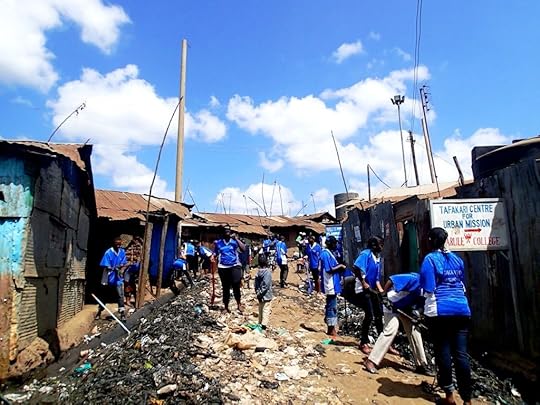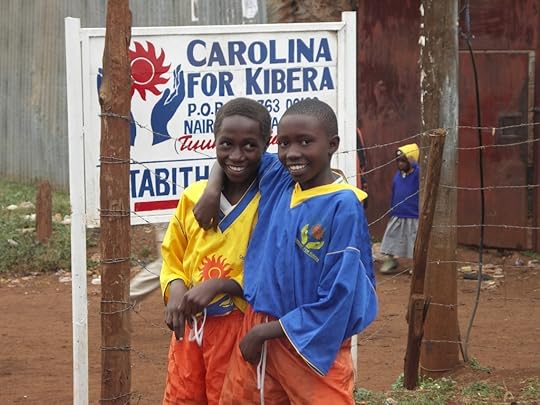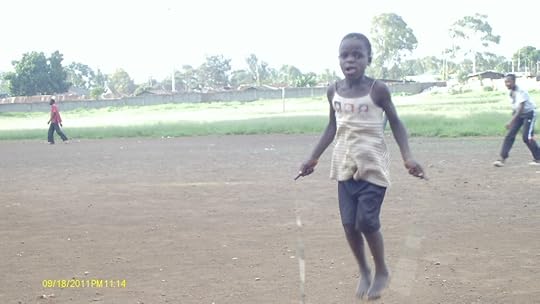Rye Barcott's Blog, page 21
July 9, 2013
The CFK Sprinters: New Uniforms, New Inspiration
[image error]The members of the Carolina for Kibera (CFK) Jump Rope Team, the CFK Sprinters, could barely contain their excitement when they heard from their coach, David, that the much-anticipated uniforms had finally arrived. The team was so happy that they spontaneously began jumping up and down at the good news and begged David to bring a sample to the practice that afternoon. He said no, but promised them that they would be performing with the uniforms very soon.
When they finally saw the 64 new uniforms, everyone agreed that they color, fit, and design was “awesome.” They also commented that the material is durable, easy to wash/dry, and is very comfortable when performing. In short, they’re perfect.
Coaches and players alike are very enthusiastic and excited for the increased professionalism and visual uniformity that this will bring the team. Previously, the team wore mis-matched outfits with various colors and had no logo to distinguish themselves. They are hopeful that the new uniforms will help build their identity as a team during their outreach events and performance both in and outside Kibera.
Only the top 30 jumpers are given the privilege to wear the uniform and perform on behalf of the team. With the new uniforms’ arrival, coaches report that the attendance at practices and competitiveness of auditions has increased, with each jumper vying for a chance to represent their team and wear the new uniforms proudly. The uniforms have improved the level of commitment from individual jumpers and attracted new youth who are interested in joining the team.![Jump Rope 3 [Edited]](https://i.gr-assets.com/images/S/compressed.photo.goodreads.com/hostedimages/1380990064i/3706468._SX540_.jpg)
Recently, the team has had the fortune of performing at some high-profile events. Milo (a product of Nestle) put on a festival at Nyayo National Stadium (the second biggest in Kenya) for kids to enjoy before returning to school after the holiday break. Attracting more than 20,000 attendees, the CFK Sprinters were honored to be included in a lineup of local artists and performers.
The team also performed at the Copa Coca-Cola under 17 Youth Soccer Launch at City Stadium in Nairobi. The Sprinters’ unique performance stood out from the crowd as many people hadn’t seen such a diverse display of the different ways to use a jump rope. They were an audience favorite, and had nearly the whole stadium on its feet and cheering during their performance.
The long-term plan of the team is to use performances as an income generating activity to sustain the program. Currently, the team receives a small contribution for performances which typically covers the cost of transportation and a simple meal for the jumpers. The department head and program officers have met with several local event managers to learn more about talent management. Following those meetings, we are currently in search of a volunteer with strong marketing skills to assist in developing that aspect of the program. It is our hope that they will be able to train one of the coaches or older jumpers to take on this role in the near future.
We couldn’t have said it better ourselves.
Crossing Gender Lines for Children’s Health
Photos and Story by: Caitlin Kleiboer, 2013 CFK Peacock Fellow
—
A few weeks ago, several community health workers and I gathered in a room on the top floor of Carolina for Kibera’s Tabitha Medical Clinic. Men and women came in wiping their brow from their long walk in the mid-afternoon sun from three Kiberan villages—Kianda, Gatwekera, and Soweto West—served by the CHWs working through the Tabitha clinic. Roosters crowed outside, and out of the windows, all you could see was a sea of tin roofs colored brown by years of rust and dust.
Those images may not be what usually come to mind when someone begins a story about breastfeeding workshops.
Lately, the Tabitha Medical Clinic has been holding these workshops for the community health workers (CHWs) on staff. CHWs extend the Tabitha Clinic’s message of accessible healthcare for everyone by traveling to different parts of Kibera and interacting with community members in their homes. They assist with a number of initiatives, including home-based HIV/AIDS testing and counseling.
So far, the clinic has held 2 breastfeeding technique trainings, with 6 more coming up. Before the session a few weeks ago, I was able to meet briefly with Dr. Grace Wairimu, the workshops’ instructor, to learn more about the training and the community’s need for it. Dr. Wairimu is a pediatrician and professor at the University of Nairobi’s School of Medicine. She explained that breastfeeding has not been taught in medical schools in Kenya, and that there is little to no emphasis on the importance or benefits of breastfeeding for the child or mother. After years of being a pediatric nephrologist (a children’s kidney specialist), she became frustrated with the cases she saw day after day—cases that were almost always preventable. She now focuses her time instructing classes and workshops such as those being offered at CFK’s clinic.
For me, the most fascinating aspect of the training was how much emphasis everyone put on the male community health workers’ attendance. 7 of the 20 participants were men, who were very engaged in the conversation and excited to implement what they learned. Future trainings are going to focus more on male CHW attendance.
When I asked why that focus will shift for upcoming trainings, I learned that the women who the CHWs serve are more likely to listen to advice on breastfeeding from men, rather than advice from other women. This surprised me, given that much of what I learned in my public health training at UNC suggested that women are more apt to listen to health advice from other women, especially their female family members.
Following up with this, I spoke to Mark Muasa, the Clinic Manager at the Tabitha Clinic. He explained that men need to be involved in the discussion and practice of breastfeeding because they are most likely to represent the role of decision-maker. Training more male CHWs will open more avenues for informing the men of the household. If you can get buy-in from men and impress upon them the importance of breastfeeding, the women will be more likely to also accept it.
It’s really a genius idea. By acknowledging that gender roles shape relationships, the staff at the Tabitha Clinic are using them to help improve health in the community while they also work to re-shape those roles.
UNC Nursing Student & CFK Intern Lisandro Reflects on What It Means to Volunteer
By: Kai Schwartz, CFK 2013 Peacock Fellow, and Nick Johnson, CFK Staff Associate
—
A perk of being affiliated with prestigious universities like the University of North Carolina and Duke University is having access to a pool of students interested in service projects and fellowships abroad. Every summer, Carolina for Kibera sends several student volunteers to Kibera to complete projects by working with and learning from staff there.
One of our volunteers, Lisandro Hernández, still talks glowingly about his 3-week internship in Kibera after returning to the U.S. only a week and a half ago. His impressive background includes over 10 years of experience in the medical field, 4 of which he spent working for the public healthcare system in his home country of El Salvador. After moving to the United States, he began working as an anesthesiology technician at Duke University Medical Center while getting his nursing degree at UNC.
As a result, Lisandro provided a unique perspective on global health while volunteering at CFK’s Tabitha Medical Clinic. He spent most of his time working with the clinic’s community health workers (CHWs), who conduct medical home visits throughout Kibera and assist with CFK’s new cervical cancer screening program. He also helped administer daily care and health advice to patients at the clinic and CFK’s brand new nutrition center.
Reflecting on similarities between his native country and Kibera, he mentioned how communities in El Salvador “share very similar problems,” but that it was hard to fathom the severity of those same problems in Kibera. His experience working in El Salvador’s public health system closely matched the work done by the CHWs in Kibera. “El Salvador is a third-world country,” he explained, “so we did a lot with sanitation, water purification—mainly preventative medicine, stuff like washing your hands and cooking your food thoroughly. The CHWs’ project really drew me to CFK.”
Though Lisandro provided the Tabitha Medical Clinic with an abundance of both professional assistance and experience, he remained conscious of his roles as a student, a volunteer, and most importantly, a foreigner to Kenya. Instead of going to “fix” anyone’s life, he focused on sharing his experiences and learning from others:
“I knew that I wasn’t going there to fix any particular person’s life. I knew that I was there still under my role as a student. However, once I got there and started engaging with the community and the people and the staff and everything, I started pulling things from different places that I already had in me, and trying to work on different projects. At some point, I learned that my work, even if I was working there 24/7, even if I was doing this or that, I was only one person. What I learned there is actually to make a difference, you need to mobilize. And it’s not just that. You need to have the agreement and the understanding of the people you are working with.”
When asked about one piece of advice he would give to future volunteers, Lisandro said, “The basic thing that you can do is offer your heart. I just offered myself. That’s something that I really love, to share the little that I know with others, and to help others with what I have.”
We couldn’t have said it better ourselves. Lisandro’s perspective on what it means to share one’s time and skills really speaks to what CFK stands for, and how both students and local leaders learn from each other when they volunteer abroad. Our staff agrees, and expressed their thanks to Lisandro:
“We’re glad you learnt so much from us, for we also learnt a lot from you. We thank you for the amazing things you did for the few weeks you were ar ound. We liked your zeal and your spirit of self, and how you are open to learning and at the same time to support. Thank you for choosing CFK as a place for your professional development and we wish you well and all the best as you finish your studies. Kind regards.”
June 27, 2013
John’s Admission to College
Text by: Nick Johnson, CFK Staff Associate
Photos by: Caitlin Kleiboer, CFK 2013 Peacock Fellow
—
![John_Working_2_Caitlin_Kleiboer [web res]](https://i.gr-assets.com/images/S/compressed.photo.goodreads.com/hostedimages/1380990064i/3706472._SX540_.jpg) It’s been almost a year since we first introduced the recipients of CFK’s new Alan Cross Memorial Scholarship. Named in honor of our late friend and board member, Dr. Alan Cross, the scholarship was designed to provide financial aid for diligent students who are interested in pursuing careers in healthcare. Last February, we heard from Laurine Oloo Otawa about her first semester in college and all of the challenges she faced and overcame. Now, we hear from John.
It’s been almost a year since we first introduced the recipients of CFK’s new Alan Cross Memorial Scholarship. Named in honor of our late friend and board member, Dr. Alan Cross, the scholarship was designed to provide financial aid for diligent students who are interested in pursuing careers in healthcare. Last February, we heard from Laurine Oloo Otawa about her first semester in college and all of the challenges she faced and overcame. Now, we hear from John.
John Antony Mwaura has not let his family’s economic struggle get in the way of his passion for learning. Though he had to switch schools a lot because his family could not regularly pay his school fees, education never stopped being his priority. John would often take casual part-time jobs to help supplement his family’s income and pay the fees. Always persistent, he completed secondary school with remarkable grades—high enough that he could attend university. The only thing stopping him was the cost of enrollment.
On top of his desire to get an education, John is an active participant in CFK’s Sports Association, where he now helps lead life skills trainings for younger players. His continued dedication to multiple educational programs was a strong motivating factor in his selection as a scholarship recipient. (You can read more about John and our other scholarship awardee, Laurine, here.)
Now, with your help, John has finally achieved what he has always dreamed of: going to college! He recently got accepted to the P.C.E.A. Tumutumu School of Nursing, where he will study to be a nurse. Here, John reflects on the process of applying for colleges:
![JohnHeadshot_Caitlin_Kleiboer [web res]](https://i.gr-assets.com/images/S/compressed.photo.goodreads.com/hostedimages/1380990064i/3706473._SY540_.jpg) “It has taken me long to get admission. The first reason why it took long to be admitted was because I was comparing the school fees of different colleges. Some institutions cost more than others. The second reason was that I had applied to some institutions, but they never admitted me because capacity had been over-stretched. In addition, I was also looking at the surroundings of the institutions, e.g. if they had their own hospital, enough teachers, enough classes, etc. I was also comparing their performance and looking at how old each school was.
“It has taken me long to get admission. The first reason why it took long to be admitted was because I was comparing the school fees of different colleges. Some institutions cost more than others. The second reason was that I had applied to some institutions, but they never admitted me because capacity had been over-stretched. In addition, I was also looking at the surroundings of the institutions, e.g. if they had their own hospital, enough teachers, enough classes, etc. I was also comparing their performance and looking at how old each school was.
“I have changed the course which I wanted to pursue. I had told the Education Officer that I wanted to pursue a career in Clinical Medicine, but I changed to Nursing. The reason why I changed was that I came to realize that Clinical Officers were only recognized in East Africa and not in other countries in the world. I did this during consultations with the Education Officer, who advised me accordingly. Also, I was told by a lecturer at the University of Nairobi that nurses have high demand in many nations. Since I aspire to be a surgeon in the future, I was told that nursing could be the best route since I will specialize in surgical or medical nursing.”
Though his course of study has changed, it is clear that John is just as excited and passionate as before to continue his education. In addition to enrolling in college, he continues to participate in the Sports Association as a mentor for younger players. The leadership and enthusiasm he displays on and off the field—and inside and outside the classroom—will undoubtedly lead to his educational success. We’re cheering him on as he takes this next step forward!
June 13, 2013
First Week in Kibera
[A bit of background: Every year, CFK selects undergraduate and/or graduate students for our Peacock Fellowship program. Candidates work with CFK staff for a full year in order to develop projects that they will later implement in Kibera. Upon their return to campus, CFK Peacock Fellows help tell the story of Kibera to other students and faculty.
This year, two students were awarded fellowships. You can read more about them here. Below, we’ve included a blog post from one of our Fellows, Kai Schwartz. In the post, Kai vividly recounts her first week in Kibera. If you would like to learn more from her about her time there, be sure to follow her on her personal blog.]
—
By: Kai Schwartz, 2013 CFK Peacock Fellow
Since my arrival I’ve only seen two parts of Kenya: the slum that I’m working in, Kibera, and an adjacent middle class neighborhood where I live, called Jamhuri. Despite the limited number of places I’ve been, I’ve managed to accumulate pages of notes and observations.
 The majority of my time has been spent becoming acquainted with the various programs Carolina for Kibera (CFK) is involved in. I’ve been assured, on several occasions, that the education program I’m working with (called “Angaza” – which means “to shine light on”) is an “exit strategy” for other programs. I’m not entirely sure what that means. Kenyans and I both tend play a game where we nod and smile when we don’t understand each other. I play a lot. As much as possible, I try to ask people to repeat things or to say them differently, but sometimes the social situation necessitates a large smile, a nod, and an enthusiastic “sawa” (Swahili for “okay”), and we change subjects. I’m figuring it all out slowly.
The majority of my time has been spent becoming acquainted with the various programs Carolina for Kibera (CFK) is involved in. I’ve been assured, on several occasions, that the education program I’m working with (called “Angaza” – which means “to shine light on”) is an “exit strategy” for other programs. I’m not entirely sure what that means. Kenyans and I both tend play a game where we nod and smile when we don’t understand each other. I play a lot. As much as possible, I try to ask people to repeat things or to say them differently, but sometimes the social situation necessitates a large smile, a nod, and an enthusiastic “sawa” (Swahili for “okay”), and we change subjects. I’m figuring it all out slowly.
Almost everyone I’ve met speaks English, but the sentence construction is slightly different and often, people speak in almost a whisper. I lean in closer and closer. “Could you repeat that?” I ask for the third time as my ear hovers inches from their face, struggling to hear a tiny voice. In the United States, someone would back away and roll their eyes. However, personal space seems smaller and patience greater among the people I’ve met.
People also hold hands more. Men with men, women with women, and men and women. It’s something I’m trying to get used to. At home, I never touch people I’ve just met. If we’re being honest, I don’t really enjoy publicly touching people I know all that much. The first time someone just grabbed my hand as we were walking, I wasn’t entirely sure what to do.
I’ve seen the Binti Pamoja girls program, which promotes leadership skills, addresses gender-based violence, and hopes to prevent teenage pregnancy and drug use while encouraging girls to stay in school. It has some thousands of girls who have gone through the program. I missed the exact number, but the number of “Safe Spaces” (groups of girls who had graduated) was in the dozens.
I also visited the Tabitha Medical Clinic, which provides medical services and a pharmacy. It should be noted that to get there, one must traverse Kibera’s notorious 3-foot wide corridors between mud hut homes. The plastic bags and trash are imbedded so completely in the dirt that sedimentary layers have been created, with deep rivers of pungent black water cutting through to create putrid canyons. To navigate the corridors is less a “walk” and more a combination of wide leg hopping, leaping and balancing. Consider also the intense population density of Kibera. One must also side-step women balancing large baskets on their heads and children who run by in the opposite direction.
The Clinic is clean, and the people who work there seem proud of the services they provide and passionate about helping those who come in. I note the long line and marvel at how every piece of equipment they have was carried—by hand—through the corridors to the clinic.
Newly opening next week is a nutrition center to help severely undernourished children below the age of 4. The staff excitedly tells me about the new model they are using—from India—rather than the traditional “African” model for a nutrition center. The African model usually has the children come to the center, where they are served a meal and then given some food to take home. The India model provides more contact between the center and the children. The children stay at the center all day, and they receive two meals and preschool instruction. The staff have been very busy preparing age-appropriate teaching materials and gathering all the necessary equipment. On Saturday, a truck of brightly colored miniature chairs and giant cooking pots arrived at the main CFK building, which is on the road. We all helped to carry the water drums and patterned mattresses on our heads to the new nutrition center buildings deeper inside the community.
I don’t have any pictures for these things. Kibera as a slum seems novel to foreigners but to the people here, it is their community where they live. And overall, Kiberans are exhausted with foreign tourists coming into their community and taking pictures of them going about their daily business. I can only imagine that if I was trying to go to work, meet a friend, or go shopping and some foreigner was always there taking pictures of me, I would be very frustrated. So, in an effort to not treat people as spectacle, I don’t have any photos right now. Perhaps later, once I have a real relationship with some of the people, it will feel appropriate to ask them to take their picture, but not yet.
—
Perhaps the largest program at CFK is the Sports Association. The goal of the program is to improve tribal relations between the different tribes that exist in Kenya. Each team must be made up of kids from different tribes with the hope that the diversity will alleviate tensions. Hundreds of boys teams exist, along with a similar number of girls teams. Four players on the current Kenyan national football team are former CFK players, something that the staff is very proud of..
I had not seen a game yet until Saturday, when a CFK staff member invited me to watch some younger boys play. I met “Allan” (name changed because I have not yet asked him if I could use his name on the Internet) in the afternoon. After moving the nutrition center equipment, we set off to the fields.
Allan asked if it was okay to walk. Kiberans seem very concerned that foreigners cannot walk long distances. I assured him it would be fine. I asked him how far he walks every day. He told me it takes him about an hour to get to Kibera every day. His skepticism about Americans’ ability to walk long distances seemed more and more rational. I learned later that he used to live in Kibera, though his home was destroyed in 2007 during the ethnic violence following the election. His family was forced to move somewhere else. I’m not sure where. He expressed disapproval of tribalism.
To get to the fields we followed one of the paved roads, which comes with its own set of challenges. Cars, buses, vans and motorcycles all share the entire width of the road and lanes seem like a forgotten suggestion. Occasionally, oncoming traffic stays on the left (they drive on the other side here); however, more often, if the car in front of another vehicle is slow or stopped—or just because—drivers will swerve anywhere on the road. Additionally, “pedestrian right of way” is a non-existent sentiment. The attitude seems more like, “They’ll probably get out of my way.” The sidewalks are consistently overcrowded, and walking in the street with the cars, buses, vans, and motorcycles is the norm.
Keeping up with Allan goes like this: 5 feet on the sidewalk, dodging people (who also don’t have an assigned side of the sidewalk), three steps in the street. Step back onto sidewalk as a bus whizzes by. Back into street. Jump between two people into a clearing on the sidewalk. Walk under a board someone is carrying on their head. Back into the street for a while. And so on. Allan expertly weaves in and out of people and I hustle to try to keep up.
The field is a large patch of dirt, and about 20 boys have accumulated. They have one ball, and most of them wear worn-through cheap plastic sandals, crusted with mud. I meet some CFK coaches and community outreach officers. We’re waiting for the referees. I sit down with the CFK staff, who I guess to be between the ages of 16 and 20. They ask me about the differences between Kibera and America. I say that the level of poverty is one of the most obvious differences. However, Kiberan’s creativity, work ethic, and community resilience are also strengths I’ve noticed as well. We discuss for a while how best to encourage a community to maintain its strengths while eradicating poverty.
The conversation turns to politics. The recent election is still a common topic and the young men debate back and forth, switching between English, Swahili and Sheng (a language only found in Kenyan slums that deserves its own blog post entirely). The fluid transitions have become something I’m accustomed to; however, it is another challenge to my understanding of any given situation. Every once and a while, one of the young men will stop and look at me and speak solely in English. He throws out statistics and poll numbers and refers to regions I’m unfamiliar with for about two minutes. “See,” he concludes, “that is how the results cannot possibly make up 51% and so a commission should be held.” I determine that a smile, a nod, and an enthusiastic “sawa” seems appropriate. And another boy laughs and shakes his head. “No, no, no,” he says, as they tumble back into their debate.
During a pause, I ask Allan about his life goals. He wants to be a surgeon. With the way schools work here, if he can get all A’s and pass a very difficult national test, the government will pay the majority of his University fees. However, a major obstacle for poor Kenyans is high school fees, which many families cannot afford. I’m too timid to ask if he is in high school, knowing that many good students cannot come up with the funds (approximately $150-$300) for a year of high school.
I watch the boys on the field for a bit. Despite their bare toes and the dirt, they dribble the ball up and down the field energetically.
The game finishes and Allan suggests we go to another CFK event in Kibera. I agree, despite not knowing where we’re going or what the event is. My uncertainty has become routine.
We walk back past the CFK office and turn to go deeper into the community. We go through the corridors, over the putrid black water, balancing on scraps of wood laid down as treacherous bridges. We come to a clearing where there are some railroad tracks, used as a foot traffic thoroughfare. While trash is omnipresent in Kibera, at a clearing, a waist-high pile of garbage is being picked through by featherless chickens and starving dogs. We stand next to the trash pile after we run into another CFK staff member. I shake his hand and make an introduction and we small talk. None of the people around me seem even aware of the heap of garbage we are literally a foot away from. I pretend not to smell the decay.
I follow the CFK staff some more down unfamiliar roads and corridors. Suddenly they stop and indicate that I go through a curtain into a mud hut.
A nod, a smile and an enthusiastic “sawa.” Again, it seems the most appropriate response.
And suddenly I’m in a room of about 25 children sitting on rows of crude 4-inch wide boards, perilously held up by sticks. The gap between the mud walls and the tin roof is supported by Styrofoam from electronics packaging. Holes in the mud walls let in the small beams of light.
After my eyes adjust to the dim room I see another CFK staff member in front of the group, talking about hygiene. Allan and I take a seat in the back. Allan occasionally translates what I assume is Swahili, though it could be Sheng. I don’t know. Everyone here seems to speak at minimum 3 languages, though more commonly, they speak 4 or 5. Suddenly, the CFK staff member is waving to me. And says, “Now you come up. Tell them what you’re doing.” A smile, a nod and an enthusiastic “sawa.”
I try to adapt my dry, conceptual, very adult project description for the young audience. They smile and laugh, though I can’t imagine I’ve made much sense or been very interesting. I hadn’t really prepared any material. “Ummmm…..any questions?” I ask, eyeing the CFK staffer to see if I can exit the stage.
There are lots of shouts from the audience. “Where are you from?!” “How old are you!?” “What is your favorite food?!” I answer a few simple questions when suddenly the questions take a turn and halt on “What are your talents!?” I’ve got nothing. “Can you dance!?” they shout. “Not really,” I respond. “Can you sing!?” they shout. Again, I insist, I am a horrible singer. “Dance for us! Dance for us!” It’s a chorus that won’t stop as much as I try to redirect them. “I like to be out in nature…” I try, hesitantly. “DANCE!” they keep shouting.
So I dance. It involves some index finger shaking and some knee bending. It’s pretty bad. They laugh. “Sing!!” becomes the new chorus. “Oh god,” I think. I suggest they sing the Kenyan national anthem instead. They like this and in high children’s voices they sing. Finally, I’m relieved from my impromptu performance.
I take my seat again and a different CFK staff member gets up to give a presentation on rape. Topics include: “What causes rape,” “What happens to people after rape,” “What you should do after you are raped,” and “How to prevent rape.” To encourage audience participation, the presenter asks questions and the children respond. “What kinds of rape are there?” the presenter asks the crowd of kids who looked like they could be in elementary school. Hands shoot up “stranger,” “incest,” “sodomy,” “familial,” “date,” they answer easily. I’m surprised with how much they know about all the rape-related topics. Laughing persists throughout the session, and I sense that some aren’t exactly sure how to respond to the material.
And then it is off for soft drinks. The whole experience causes me to reflect on the fluidity with which topics flip between levity and seriousness here.
On our way to get Fantas and Coca Colas, one of the CFK staff grabs my hand as we walk. I’m more awkward than I would like. I tell her I am impressed with her presentation because I don’t think in America we usually talk to children so young about rape. She comments on how alarmingly close the topic is to their daily experience.
On some levels, their perception on types of prevention and the causes of rape irk the feminist in me. However, the openness of the discussion is admirable and the engagement with youth ambitious. The CFK staffer explains how Kenyan parents are reluctant to talk about rape with children, but gender-based violence among the young is common.
As the children have sodas, I bid the staff goodbye and thank them for inviting me to participate in their Saturday activities. I turn the corner from the soda shop and step onto a main street towards home. It’s on a hill and I can see in the distance a wide street, packed with people, cutting through the endless tin roofs.
June 10, 2013
Paying It Forward: Creating Safe Spaces for Others
By: Suzanne Thomson, Organizational Consultant, CFK Kenya; and Nick Johnson, CFK Staff Associate
Kibera can be a dangerous place for adolescent girls. Routinely faced with gender-based threats and discrimination, it is incredibly important for young women to have a safe space in which they can express themselves and learn how to keep themselves and others out of harm’s way. Because Kibera is so dense and overcrowded, those places are often difficult to find. Privacy is essentially nonexistent, causing many girls to feel constantly exposed.
As part of its Daughters United program, Carolina for Kibera encourages program graduates to create Safe Spaces—both physical and emotional—throughout the community for their peers. Groups typically meet at churches or schools that have opened their doors to them. There the girls form havens where they feel both physically and psychologically safe.
Recognizing the need for these havens, Lorine eagerly took up the challenge of opening not one, but two Safe Spaces. The second oldest of four girls, Lorine graduated from the Daughters United core program (also known as Binti Pamoja, or “Binti” for short) in 2008 at the age of 14. She was able to continue to secondary school and graduated last year. Though she took time off from Binti to focus on her studies, she returned after graduation to give back to her community in Kibera by setting up her Safe Spaces, one of which is currently being launched as an organization of its own.
As the leader of both of these groups, Lorine helps girls, aged 10 to 17, to feel empowered so that they can enact change they want to see in their community. Following the Daughters United program model, Lorine uses drama, poetry, debate, and other creative techniques to reach the girls with whom she works. She encourages the girls in her Safe Spaces to have high self-esteem and to be assertive in their decisions. She also leads workshops about reproductive health and financial literacy, providing them with skills and information that will be helpful throughout their lives.
When asked about her role as a mentor to so many girls, Lorine explained that being a mentor helps keep her on the right track because she knows that there are many looking up to her. She expressed that many people have a negative impression of Kibera, but she wants the girls she mentors to know that Kibera isn’t a bad place, that “nothing is impossible for a willing heart, and that it’s all about one’s mentality.”
A confident, determined young woman, Lorine likes to visit her family in Kenya’s countryside when she’s not working with the girls in her Safe Spaces. Though she has finished secondary school, Lorine doesn’t see this as the end to her education; she hopes to join university one day to study social community development. As she continues to affect social change and develop her own community, she sets a remarkable example for the young women she mentors, inspiring them and others to go after their dreams—and to help make it easier for others to do so as well.
June 6, 2013
Thank You, RTI International!
It’s always a good day when you open your email and find out that you are being awarded $5,000, especially when you and the donor share many things in common!
CFK would like to extend special thanks to RTI International for their generous gift of $5,000, along with new jump ropes for the Jump Rope initiative of our Sports Association. This gift will help us continue extending opportunities to the residents of Kibera.
It is an honor to be recognized by RTI International, a leading research institute in international development, for being an organization that aligns with their mission of putting knowledge into practice at the local level. With offices in both Nairobi, Kenya, and the Research Triangle, North Carolina, RTI has witnessed CFK’s work first-hand on two continents. These connections make their gift even more meaningful. We would especially like to thank John, James, Hellen, Lydia, Dorine, and Victor for taking a day to visit the CFK staff and the Kiberan community.
Once again, thank you. We are extremely grateful for your generosity.
—

RTI officially presenting their $5,000 gift to the CFK staff in Kibera. Left to right: Darius Isaboke, Head of Social Services Department; Hillary Omala, Executive Director; John St. Clair, RTI Director – Nairobi Regional Office and Regional Controller (Photo by Caitlin Kleiboer)
May 6, 2013
Soccer: Connecting Global with Local
By: Nick Johnson, CFK Communications Intern
—
It’s that time of year again—Carolina for Kibera’s soccer leagues are getting started, and it is obvious that players are excited! For the last few weeks, Kiberan youth have been preparing on and off the pitch, practicing with their teams on clear days and stringing makeshift balls together with plastic bags and twine on rainy days.
Alongside teams’ regular matches, each team will participate in a series of small group discussions, called the “Caught Offside” forums. This initiative offers a safe, non-threatening space to talk about issues affecting players’ communities. In the past, these forums have centered specifically on HIV/AIDS prevention within players’ communities, but this year, players will discuss a wider variety of topics, including substance abuse and sexual violence.
Not only do these forums reinforce the Sports Association’s mission to teach healthy life choices and break down barriers through sports, but they also work to address issues that keep Kiberan youth from pursuing their passions to begin with. By building a sense of camaraderie through soccer, players can work together more comfortably to improve their communities!
The soccer program has lots in store over the next few months—tournaments will start, matches will be won and lost, important issues will be discussed. Excitement is in the air, and youth throughout Kibera are eager for matches and programs to kick off!
—
…meanwhile, across the Atlantic…
On a sunny Sunday in April, over 60 young women, ages 6 to 18, came to UNC’s campus to participate in a fun-filled day of sport, team-building, and community involvement. It was time for CFK’s annual Kick for Kibera soccer clinic, run by UNC’s National Championship-Winning Women’s Soccer Team!
In its eighth year, Kick for Kibera seeks to connect young girls through soccer, demonstrating the power that sports can have to unite people of different backgrounds. All of the proceeds from the clinic go to CFK’s Sports Association, specifically the women’s soccer initiative, which can then be used to provide supplies such as balls and cleats to CFK athletes. So, before beginning the clinic, participants learned a bit about what life and soccer are like in Kibera. Houses are typically smaller than a goal box. Soccer balls are usually made out of plastic bags and twine or any other materials kids can find lying in the streets; they are also smaller, quite different from air-compressed balls commonly found in the United States.
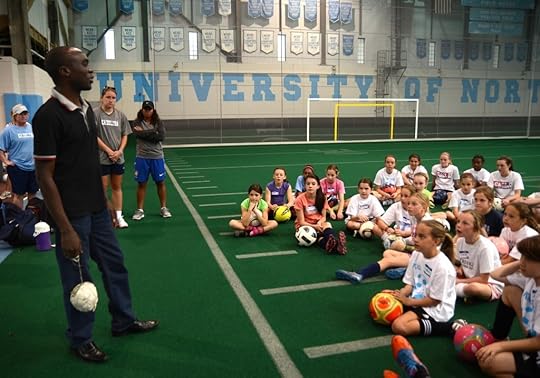
CFK Executive Director Hillary Omala talks to participants about what soccer is like in Kibera.
The rest of the afternoon was then dedicated to the clinic’s athletic and training events. And what better way to play than under the guidance of UNC’s 2012 National Championship-Winning Women’s Soccer Team? Members of the team led the girls through warm-ups, skills training exercises, and a scrimmage. As a bonus, the girls were able to take a tour of the UNC Women’s Soccer facilities, where they might have the opportunity to play one day.
Every year, Kick for Kibera helps provide resources to Kiberan youth who would not otherwise have the ability to play. The Sports Association not only seeks to offer this opportunity and develop athletic talent, but also to cultivate creativity and trust among teammates. We are thrilled that this year was such a success, and are excited to see it translate into more resources for our Kiberan players.
If you like this idea or have one of your own to make an impact in Kibera, send an e-mail to info@carolinaforkibera.org!
May 2, 2013
Sophia’s Extraordinary Jump Rope Skills
By: Nick Johnson, CFK Communications Intern
—
“Talent is universal, but opportunity is not.” In Kibera, entrepreneurs have great ideas, but do not have the funds to explore them. Potential students often lack access to affordable education that could foster learning and lead to better careers. Athletes may be able to play soccer or jump rope, but may not have safe, productive outlets to develop their skills.
Never has this phrase rung truer than when talking about Sophia Opiyo. Upon learning about Carolina for Kibera’s jump rope program, the 9-year-old girl joined with just one month remaining before the program’s first in-house competition in 2013. This competition is part of a larger process of assessing skill levels among the jumpers in order to determine placement for ongoing training.
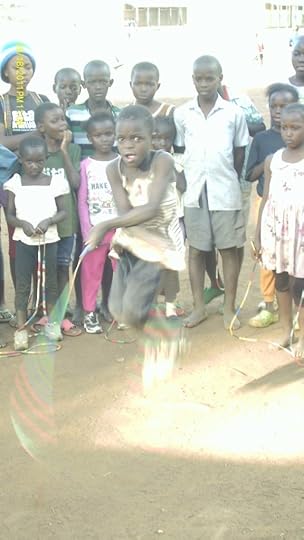
Once given the chance to practice and develop her talents, Sophia began to shine; trained for less than a month, Sophia jumped 67 times in 30 seconds. To put that in perspective, the international record for this type of jumping is 100 times in 30 seconds for the fastest boy, while the East African record for a girl is 80 times in 30 seconds. With less than a month of training, Sophia has already come close to beating the East African record! Her trainers and other members of the Sports Program’s staff immediately recognized Sophia’s talent and the potential she has to take this to a higher level—possibly as a professional jumper who performs for audiences.
Sophia balances her time with other activities. With the encouragement of her coaches, she regularly attends the Darajani Primary School, with practice afterwards on Tuesdays and Fridays. They also reinforce the idea that jumping rope is not just about speed—it’s also about teamwork, being creative, and having fun with the sport.
With the rapid growth she has already shown, it is clear that Sophia’s jump rope skills will only increase. Fortunately—and unlike many Kiberan youth—she has found an outlet to explore her passion, and supportive mentors to help her do it. “Talent is universal, but opportunity is not.” CFK continues to extend such opportunities to Kiberans with the hope that others will excel as Sophia has—and perhaps, to break records of their own.
April 9, 2013
Scaling Up for Women’s Health, Standing Up for Women’s Rights
By: Hillary Okhidi Omala, Executive Director; Nick Johnson, Communications Intern
—
Every woman deserves a healthy life, no matter where she lives or what she has. This applies to all sorts of healthcare treatments: proper nutrition, sexual and reproductive health issues, as well as avoidance of temporary and terminal illnesses. One such terminal illness is cervical cancer, to which many Kiberan women are susceptible. Since affordable care and screening services for cervical cancer in Kenya are few and far between, the Tabitha Medical Clinic (founded with a mere $26) has now scaled up its services to offer cervical cancer screenings.
A large number of women in Kibera have never been able to be checked for cervical cancer, whether it is because of day-long work and business or local myths and fears about the screenings. However, no woman in Kibera ought to die of cervical cancer; it develops slowly after the initial infection and, unlike most other cancers, is preventable when precursor lesions are detected and treated.
Screening is now available to all women of reproductive age in the community for prevention, early diagnosis, and treatment. Launched in December 2012, the program has cumulatively provided the services to over 70 women, also extending services to women infected with HIV/AIDS or who are at high risk for being infected. The clinic also provides education on cervical cancer to ensure that more women know about the benefits of early detection and can participate in cancer control and prevention.
Carolina for Kibera has responded to a significant need in Kibera. In this resource-limited setting, healthcare funding and infrastructure are typically inadequate for primary care and prevention programs like cervical cancer screenings. As a result, women are significantly more vulnerable. The Carolina for Kibera Cervical Cancer Screening Program supports women and healthcare providers to help ensure that as many women as possible benefit from these new life-saving services. It also works to dispel the previously-held, discouraging idea that such services are only available in big hospitals and come at a great cost.
Each woman is counted and counts. Every woman merits the opportunity to avoid cervical cancer, no matter where she lives. This is what CFK, through its Health Service Department, stands for through this noble program, and we are proud to be developing functional strategies to see that all women have access to the healthcare services that they deserve.
Rye Barcott's Blog
- Rye Barcott's profile
- 7 followers


![Jump Rope 8 [Edited]](https://i.gr-assets.com/images/S/compressed.photo.goodreads.com/hostedimages/1380990064i/3706467._SX540_.jpg)
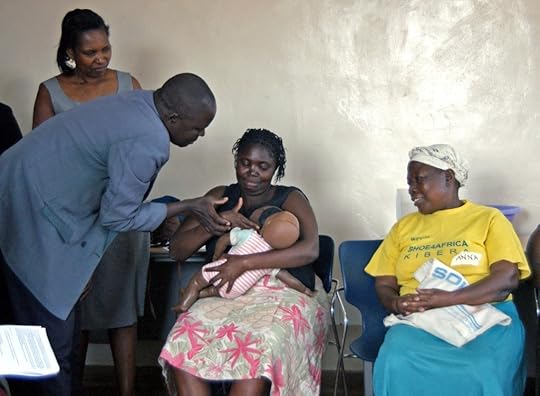
![Lisandro_2_Caitlin Kleiboer [web-res]](https://i.gr-assets.com/images/S/compressed.photo.goodreads.com/hostedimages/1380990064i/3706470._SX540_.jpg)
